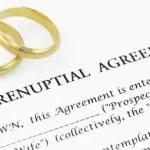Talking about divorce to draft a prenuptial agreement is by no means romantic. Regardless, it’s essential to think about what marriage entails for you. Also, it is important to know how to protect your position in this arrangement.
With that in mind—the need for prenuptial agreements is equally vital as wedding arrangements and romance before marriages. Therefore, you need to be aware of the 5 essential prenuptial facts.
Table of Contents
Prenups don’t indicate mistrust
Initially, prenuptial agreements imply a lack of faith or confidence in the future of a marriage. Therefore, when a couple is courting, in love, or just got engaged—they frequently avoid having indispensable financial conversations.
The truth is—a prenuptial is just as valuable in establishing transparency and expectations for a happy marriage. Moreover, it can protect you in the event of a failed marriage.
You see, conflicts that develop after a marriage frequently center on money and assets. In that case, prenup covers the unanticipated changes, guaranteeing your finances are managed according to your intentions during and after marriage.
Prenups are not for riches only
The amount of money you have has nothing to do with your desire to have a successful marriage. Additionally, you don’t even need to be extremely wealthy to afford a prenuptial agreement.
So let’s say you own a business or share real estate holdings. In that case, it’s crucial to have a prenup. The agreement can secure those assets and divide or allocate compensation in place of an asset division.
Also, a prenuptial agreement specifies who is responsible for paying off any student loans that either of you has or expects to acquire while you are still together.
Ultimately, you can avoid unpleasant surprises after you get married by having thorough and honest discussions about how you’ll manage your individual and joint finances.
Protects the best interest of both spouse
You will be glad to know that—modern prenuptial agreements protect the interests of both spouses. For instance, two spouses might decide for the mother (other spouse) to stay at home and raise the children.
In that case, your spouse might demand that the agreement have to contain clauses compensating them for the interruption in their career through spousal support.
Besides, in a proper prenup, both parties will be completely honest about their assets and debts. That way, you can make a prenuptial enforceable. From a practical standpoint, this is crucial.
At the end of the day, you’ll be happy that your agreement is reasonable from the beginning if you need the court to enforce it.
Prenups help to set roles and expectations during a marriage
A prenup can also define each party’s financial responsibilities and roles throughout the marriage.
For example, you can seek an understanding that both partners will use a joint bank account. As a result, you can spend money on shared costs, savings, and investments. And each party might want to keep some of their respective income for personal use.
If you have a prenup, both of you will have economic independence during the marriage to spend some of their own money however they please.
As a result, you will face less conflict regarding how and why one spouse is spending their money. However, the joint account helps to achieve the goals that both partners in a marriage share.
You can form it according to your needs
You can decide the issues you want to include. Perhaps your biggest concerns are your premarital assets, inheritance, or spousal support. Also, you can restrict the scope of your premarital agreement.
For instance, if your only concern is securing your premarital assets, you can limit the scope of your premarital agreement to just how your separate property assets will be handled if you pass away. That means you can include topics according to the necessity.
Final remarks
Marriage is viewed by the law as a contract between the couple. And that contract confers on each spouse certain innate property rights.
If you don’t make a prenuptial agreement, your state’s laws will decide who owns the assets you made amass your marriage and what will happen to those in the event of a divorce or death. On top of that, the belongings you owned before getting married may even be governed by state law.












